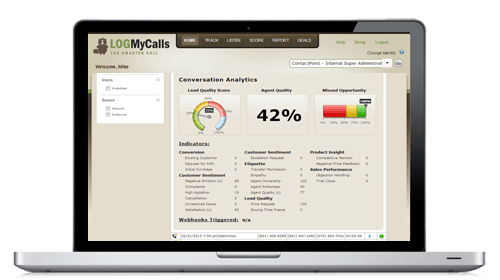Call tracking tells marketers which ads, campaigns, and keywords generate calls. It’s used by agencies, SMBs, and enterprise-level companies.
Call tracking improves their ROI and provides valuable insights into their marketing data.
But, there are also some holes in the call tracking metrics. For example, call tracking provides surface data about campaigns (really just the referring source), almost no data about leads, and absolutely no data about conversions.
Deeper Call Analytics Are Critical
Surface call tracking just won’t cut it anymore. Calls are more important than ever.
- Over $68 billion dollars were spent on advertising in 2012 to generate phone calls. That number will be higher in 2013.
- Research just released from Google found that 70% of local mobile searchers make a phone call immediately after a mobile search.
- And, according to BIA/Kelsey, it takes 4 web leads to produce the revenue generated from 1 phone call.
And as the CEO of a local SEO firm recently told me: “I wouldn’t accept a web analytics tool that only gave me surface data, so why would I accept a call analytics tool that only gives me surface data?”
The 7 Analytics Call Tracking Simply Can’t Provide
A lot of really important things happen after the phone rings. And sadly, call tracking misses ALL of that data. Conversation Analytics mines every call using sophisticated speech recognition technology and then searches the call with thousands of simultaneously operating algorithms. These algorithms rip the call apart and look for useful indications about what took place on the call. Then it spits out dozens of metrics Conversation Analytics calls ‘indicators.’
Call tracking analyzes what happens before the phone rings. Conversation Analytics what happens ON the call. It literally extracts lead data, customer intelligence, and marketing analytics based on the words and phrases that are actually said on the call. So what are examples of the data that Conversation Analytics gathers that call tracking simply can’t provide?
1) Lead Score – Conversation Analytics picks through the call content and looks for indications that the caller is a good lead. For example, if the caller is asking questions about the product, if they say specifically, ‘I’m in the market for xyz,’ or, ‘I need a quote on a 2013 BMW’ Conversation Analytics would confident that caller is a good lead. Conversation Analytics literally analyzes dozens of individual cues to determine if the caller is a good lead—these range from words and phrases said on the call to volume, rate of speech, and percentage of silence on the call.
PPC marketers use the Lead Score indicator to compare campaigns and ad groups against one another. Agencies use this to analyze lead quality data for their clients.
2) Conversions – Conversation Analytics is built to recognize ‘conversion events’ on a call. This could be hearing the words ‘So I’ll bring my car in tomorrow at 2:00’ during a call to a tire store. Or recognizing the words ‘confirmation number’ and ‘credit card number’ within 15 words of one other on the call.
Long story short: Conversation Analytics can determine if the call ended in the way you wanted it to.
Agencies LOVE this metric. It allows them to show their clients how many—not just visitors, or even leads they’re generating for the client—but actual conversions. That’s powerful data at an agency’s disposal.
3) Missed Opportunity – If the caller was a good lead—measured, again, by the words the caller said on the phone—but didn’t end up converting, this would be a Missed Opportunity. This might be the most important metric within Conversation Analytics.
It is the ultimate sales accountability metric. Agencies can show their clients they’re generating high quality calls, but that the calls aren’t converting. Marketing teams can show their brethren in sales that good calls are coming their way, but they aren’t being capitalized upon.
4) Sales Inquiry – Conversation Analytics can determine—again, by the words said on the call—if the caller was just casually asking about the product or was truly interested.
5) Complaints – Conversation Analytics can clearly determine if a caller complained either about something.
6) Buyer Confusion – This metric can determine if a caller is confused. This confusion can arise from ad copy, landing page design, product packaging, pricing, or even a bad sales person. Conversation Analytics can easily pick out confused callers.
7) Appointment Set – Conversation Analytics can track whether or not a follow-up appointment was set. It can even determine whether the follow-up appointment is a phone call or an in-store visit.
To learn more about Conversation Analytics please download The Quick Guide to Conversation Analytics.




